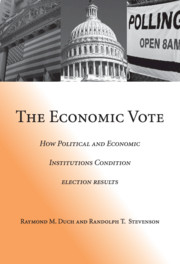Book contents
- Frontmatter
- Contents
- Preface
- 1 Introduction
- Part I Describing the Economic Vote in Western Democracies
- Part II A Contextual Theory of Rational Retrospective Economic Voting: Competency Signals
- 5 Competency Signals and Rational Retrospective Economic Voting
- 6 What Do Voters Know about Economic Variation and Its Sources?
- 7 Political Control of the Economy
- Part III A Contextual Theory of Rational Retrospective Economic Voting: Strategic Voting
- Part IV Conclusion and Summary
- Appendix A
- Appendix B
- Appendix C
- References
- Index
- Cambridge Cultural Social Studies
7 - Political Control of the Economy
Published online by Cambridge University Press: 06 July 2010
- Frontmatter
- Contents
- Preface
- 1 Introduction
- Part I Describing the Economic Vote in Western Democracies
- Part II A Contextual Theory of Rational Retrospective Economic Voting: Competency Signals
- 5 Competency Signals and Rational Retrospective Economic Voting
- 6 What Do Voters Know about Economic Variation and Its Sources?
- 7 Political Control of the Economy
- Part III A Contextual Theory of Rational Retrospective Economic Voting: Strategic Voting
- Part IV Conclusion and Summary
- Appendix A
- Appendix B
- Appendix C
- References
- Index
- Cambridge Cultural Social Studies
Summary
The previous chapter suggests that voters are attentive to economic fluctuations in a manner consistent with our competency theory. In this chapter, we explore whether there are features of the political-economic context that affect these competency signals in a systematic fashion and, hence, account for the contextual variation in economic voting that we saw in Chapter 3. For example, the evidence presented in the previous chapter suggests that voters understand the extent to which their domestic economy is subject to the influence of global economic factors. Does this help account for the contextual variation in economic voting? Although there has been speculation in the economic-voting literature about the links between these features of the policy-making context and the economic vote (Lewis-Beck, 1988; Powell and Whitten, 1993), the results have been mixed. Improving our understanding of this link requires a more developed theoretical understanding of how individuals use information regarding the political economic context to inform their vote choice.
Our competency theory provides an explanation for why, and how, fluctuations in the magnitude of the economic vote are related to these variations in political and economic contexts. Recall from the theoretical discussion in Chapter 5 that context matters because it influences the number of electorally versus nonelectorally dependent decision makers (or, using our abbreviations, EDDs versus NEDDs) associated with macro-economic policy outcomes, which in turn shapes the size of the incumbent's competency signal.
- Type
- Chapter
- Information
- The Economic VoteHow Political and Economic Institutions Condition Election Results, pp. 178 - 206Publisher: Cambridge University PressPrint publication year: 2008



